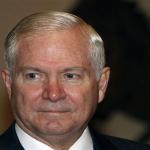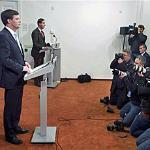23 February 2010

Photo: AP
U.S. Defense Secretary Robert Gates (file)
U.S. Defense Secretary Robert Gates called on the NATO alliance Tuesday to chart a clear path toward relevance and enhanced capability as it faces a different set of threats than it was founded to address more than 60 years ago. Gates wants a key NATO document being drafted this year to advance a transformation theme U.S. leaders have been pressing for a long time.
Secretary Gates told a NATO conference in Washington that the new Strategic Concept officials are set to write this year needs to address a wide range of issues in what he called a "succinct,... comprehensible and compelling" document that impresses Europeans raised in a post-Cold War and post-September 11 world.
"The demilitarization of Europe - where large swaths of the general public and political class are averse to military force and the risks that go with it - has gone from a blessing in the 20th century to an impediment to achieving real security and lasting peace in the 21st [century]," he said.
Secretary Gates said Europe's people must come to understand the importance of the North Atlantic Treaty Organization as an international security alliance, not just an organization for the protection of Europe's territorial integrity, as it was at its founding in 1949.
"Threats are more likely to emanate from failed, failing or fractured states than from aggressor states, where dangerous, non-state actors often operate from within nations with which we are not at war, or from within our own borders, and where weapons proliferation and new technologies make possible the specter of chaos and mass destruction in any of our capitals," he said .
Gates said NATO needs to change the way it operates - improving its budget process, investing in future capabilities and closing bases it no longer needs. He noted that for many years, the member-nations have not been willing to meet requirements for cargo planes, refueling aircraft, helicopters and intelligence capabilities. The secretary said the alliance needs to "fundamentally change how it sets priorities and allocates resources," so it can remain "relevant" in a changing "strategic landscape."

AP
Netherlands' PM Jan Peter Balkenende (L) announces in The Hague that the 2nd largest party in his alliance is quitting, 20 Feb 2010. The Dutch coalition government collapsed Saturday over irreconcilable differences on whether to extend the military mission in AfghanistanU.S. officials have pressed those points many times in recent years, urging Europeans to spend more on defense and be more supportive of NATO efforts - ranging from missile defense to the war in Afghanistan. U.S. officials say there has been progress, particularly in getting more European troops for Afghanistan.
But British researcher Sally McNamara of the Washington-based Heritage Foundation doubts whether a new document from the alliance will change what she calls the "pacifistic" trend in many European countries.
"If we look at the problems that NATO has, [such as] burden sharing, it's Afghanistan. We're in Afghanistan right now and there is nothing about a piece of paper or a treaty that is going to more equitably share the burden in Afghanistan. And that is the problem, she said."
A defense expert focusing on NATO issues, McNamara says she was initially quite enthusiastic about the plan for a new alliance Strategic Concept document. But as the process has developed, she says she has come to believe that the alliance's 28 nations will be unable to draft the kind of document they need.
"If you look at NATO's last strategic concept in 1999, it was widely regarded as one of the most useless documents because it was too long [and] it had a bit of something for everyone," she said. "This document will almost certainly do that, and that will be a shame because it won't be clear; it won't give any message about the future," said McNamara.
Secretary Gates also mentioned that concern Tuesday, speaking to NATO officials at the National Defense University in Washington.
"NATO needs serious, far-reaching and immediate reforms to address a crisis that has been years in the making. And unless the Strategic Concept spurs operational and institutional changes like those I just mentioned, it will not be worth the paper it is printed on," said Gates.
The conference is expected to be the last public discussion of issues related to NATO's new Strategic Concept. In the next phase, experts will draft a document, circulate it among NATO members and make changes needed to get the required approval from all of them, and then put it up for formal endorsement at the next NATO summit, which is expected to be held in Lisbon late this year.